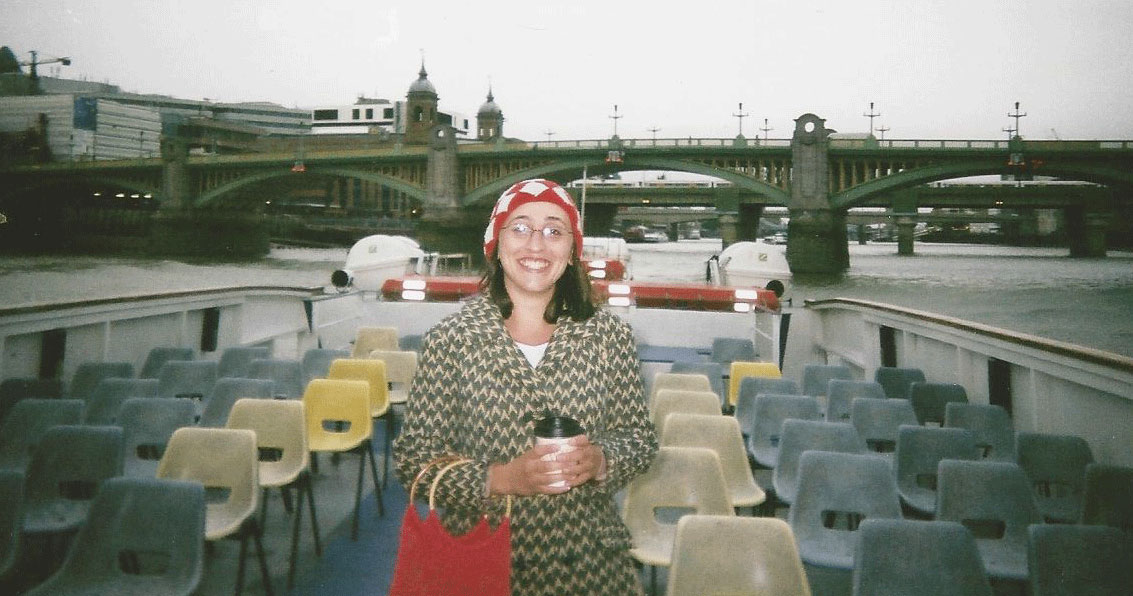I paced along the rickety commuter train aisles, en route to my first British funeral. A 30-year-old Canadian Jew in England, a foreigner, I wasn’t usually invited to take part in such lifecycle rituals. I lacked death experience aside from the smorgasbord of great uncle shivas I’d attended as a child back in Montreal. Then my close friend Helen’s brother passed away. I’d never met Simon; he had lived in a home for people with Down’s Syndrome. His death was not unexpected, but still, it was distressing, and I loved Helen (though Britishly, didn’t dare say it), and here I was venturing to his Oxfordshire town.
I passed passengers reading free newspapers, hoping my black pants/sweater combo was right, calculating how I was going to be. I’d fled to London to escape my suffocating suburban community, attracted to sophisticated anonymity and British coolness.
But it wasn’t easy. After a near-decade of intercultural struggle, of trying not to seem like a glaring outsider during my every interaction, of actively studying pop-anthropology and probing expats, I’d become self-consciously aware (very British) of the particulars of the English social ‘system’: never compliment, always underplay, and generally, do not show affection whatsoever. Basically, the opposite of me — chatty, effusive, overly friendly with strangers. The only way in which I’d been naturally Britishish was that I was self-deprecating, and, when uncomfortable, made jokes. My quipability often saved me but was not sufficient, nor even at all appropriate, in the one situation where I’d never felt comfortable: funerals.
The English, I’d determined, loathed sincerity, but when it came to religion, were earnest. I lumped death under faith, and imagined that the stiff upper lip would prevail. As my pre-ordered taxi swerved from the station through the lush countryside and I saw the smoke stacks prod up into the gray sky, it dawned on me that I’d never even been to a crematorium (a site with troubling connotations my Holocaust-surviving clan). I’d never felt so foreign and yet I was for the first time truly thankful for British restraint, exhaling smoothly only because I knew I’d be able to slink to the back of the room, Englishly avoid all eye contact, and exit as silently. I would, I imagined, look up once or twice, half-try to give Helen a knowing “I’m so sorry” glance (I practiced). That is, if she’d be looking, which I was sure, she wouldn’t.
Which is why I was particularly surprised to find, when I arrived at the Anglican complex and was directed to a crowded all-glass ‘waiting room’ that overlooked the parking lot, that Helen and her family were right there. I was even more surprised when, as I opened the door, they boldly rung out: “Judy!” The whole room, a hundred mouths, fell silent. “We’re so happy you came. Thank you for making the effort.”
My heart galloped. “Hi,” I whispered and waved. I made my way to them, chiding myself for not having prepared. “I’m so sorry,” I said, semi-leaning in for a hug (was hugging acceptable?). To my relief, Helen cut me off with a thanks.
But then she added: “Things have been difficult.”
What? Why was she telling me?
“Is there anything I can do?” I offered, still keeping my gaze low. I couldn’t breathe, imagining the air was thick with ashes.
“Do you have a pound for the vending machine?” her husband asked. Vending machine? Vending machine! I fished one out, my hands trembling.
“What train did you take?” Helen’s mother asked. “How was the ride?”
Helen’s sister joined the circle. “So glad to finally meet you.”
“Me too,” I eked out, unsure about everything. What was happening here?
The chit-chat only increased through the day. The funeral included speeches from several friends. People cried in the open. We were all invited for a luncheon at the home. Strangers offered me lifts. Tables overflowed with quiche and deviled eggs. Children crawled under furniture and trampled on azaleas. For the first time in years I felt like I was back home, smushed among deli platters and grief cheesecakes. Among noise. I even let myself compliment a stranger’s sweater. As I exchanged email addresses with a new friend, I wondered if perhaps mourning — with its ‘ou’ used in both British and North American spellings — brought us all together.
Afterwards, I was driven all the way to a tube station. Sitting in that tiny European hatchback pressed up against kind people with whom I likely shared fundamental notions of sympathy, it struck me that perhaps my very categorizing, my desire to master codes and predetermine expectations, was my problem. I would never “get” the British; life was confusing and gloriously surprising. Death hinted that I should stop looking for answers, to live a little.
A former columnist for the New York Times Motherlode blog, Judy Batalion has written for Salon, xoJane and the Guardian. Her memoir about motherhood, daughterhood and the mess in between will be published by NAL/Penguin. Find her at judybatalion.com or @judybatalion.









